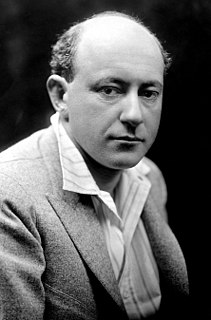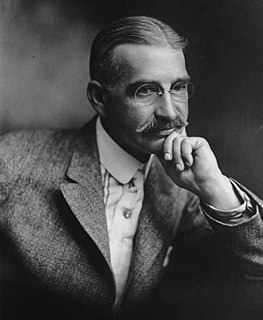A Quote by Denis Diderot
Anyone who takes it upon himself, on his private authority, to break a bad law, thereby authorizes everyone else to break the good ones.
Related Quotes
When each citizen submits himself to the authority of law he does not thereby decrease his independence or freedom, but rather increases it. By recognizing that he is a part of a larger body which is banded together for a common purpose, he becomes more than an individual, he rises to a new dignity of citizenship. Instead of finding himself restricted and confined by rendering obedience to public law, he finds himself protected and defended and in the exercise of increased and increasing rights.
Things break all the time. Glass and dishes and fingernails. Cars and contracts and potato chips. You can break a record, a horse, a dollar. You can break the ice. There are coffee breaks and lunch breaks and prison breaks. Day breaks, waves break, voices break. Chains can be broken. So can silence, and fever... promises break. Hearts break.
What is an optimist? The man who says, "It's worse everywhere else. We're better off than the rest of the world. We've been lucky." He is happy with things as they are and he doesn't torment himself. What is a pessimist? The man who says, "Things are fine everywhere but here. Everyone else is better off than we are. We're the only ones who've had a bad break." He torments himself continually.
Who can break the law? If I break this glass, it will fall down. If anyone succeeds in throwing one atom out of place, every other atom will go out of balance. . . . The law can never be broken. Each atom is kept in its place. Each is weighed and measured and fulfils its [purpose] and place. Through His command the winds blow, the sun shines. Through His rule the worlds are kept in place. Through His orders death is sporting upon the earth. Just think of two or three Gods having a wrestling match in this world! It cannot be.
A man vows, and yet will not east away the means of breaking his vow. Is it that he distinctly means to break it? Not at all; but the desires which tend to break it are at work in him dimly, and make their way into his imagination, and relax his muscles in the very moments when he is telling himself over again the reasons for his vow.
In the state of nature, wrong-doing is impossible; or, if anyone does wrong, it is to himself, not to another. For no one by the law of nature is bound to please another, unless he chooses, nor to hold anything to be good or evil, but what he himself, according to his own temperament, pronounces to be so; and, to speak generally, nothing is forbidden by the law of nature, except what is beyond everyone's power.
A curious thing about Ugu the Shoemaker was that he didn't suspect in the least that he was wicked. He wanted to be powerful and great, and he hoped to make himself master of all the Land of Oz that he might compel everyone in that fairy country to obey him, His ambition blinded him to the rights of others, and he imagined anyone else would act just as he did if anyone else happened to be as clever as himself.



































